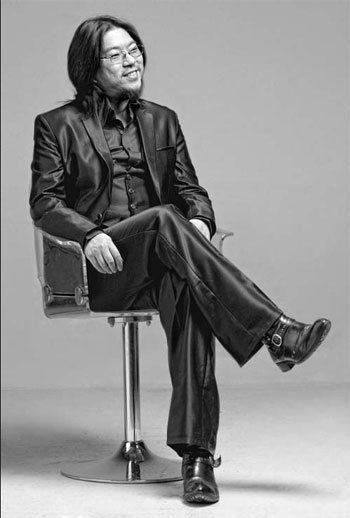14 years later and Gao is all grown up
|
Gao Xiaosong took 14 years to release his second album, Everything Grows Up. Provided to China Daily |
The cover design of Gao Xiaosong's latest album, Everything Grows Up, his second after No Regret My Youth (1996), which sold millions of copies throughout the country, is exactly the same as the first. Except, white replaces black as the basic color.
He also retains his collaboration with his old record company, Taihe Rye Music, which he founded in 1996 and which has now become one of the biggest record companies focusing on original Chinese music.
Gao says the reason is simple. There is a special connection between the two albums: both document his growing-up years.
"The music industry is down these days and CDs will disappear," he says. "I have a special feeling for CDs and (audio) tapes and want to commemorate them with this album."
For many people, especially those born in the 1970s and early 80s, Gao's name is synonymous with campus folk songs. He wrote songs that came from the heart, personal and emotional. Before that, there were either patriotic songs that dominated the TV galas or rebellious rock songs that were de rigeur at the underground clubs.
In his new album, he stays true to his style in songs like A Beijnger Lives in Beijing, which is an ode to his love for the city where he was born and raised; and My Childhood, which makes generous use of the Beijing dialect.
"When I was young, I was eager to leave this place, saying it was boring. Then I moved to Los Angeles. After a decade, I missed Beijing and everything about the city," Gao says.
This thread of nostalgia runs through the songs of the new album.
"No Regret My Youth is like a 26-year-old young man, who will cry, hold you tightly and say I love you. But this album is much more like a 40-year-old man, who will sit down and talk to you quietly, without any melodrama," he explains.
Gao has sung only two of the songs on his album. For the others, he invited nine Chinese artists - Liu Huan, Mo Hualun, Lao Lang, Zheng Jun, Yang Kun, Valen Hsu, pop-duo Shui Mu Nian Hua and Chen Chusheng, and Tan Weiwei - spanning three generations.
"I wanted singers with a heart," he says.
Why did it take him more than a decade to release these songs? "Because no one pushed me," he tells China Daily.
"You know the story of the turtle and the rabbit? The turtle reaches the end before the rabbit and is praised for his perseverance," he says. "I am glad to be the rabbit. Although people say he is lazy and arrogant, I think he has lots of time to think and take a break."
While slowing down his musical steps, he has also been expanding into other territories such as filmmaking. His 1999 directorial debut, Where Have All the Flowers Gone, revolved around two men in love with the same woman and starred actress Zhou Xun, singer Pu Shu and actor Xia Yu. In 2003, he made his second film, Rainbow, starring Chen Daoming and Li Xiaolu.
Gao quit Tsinghua University to pursue his filmmaking dream at Beijing Film Academy. He got married just three days after he met his first wife, although it was a short-lived romance. He didn't hide when paparazzi caught him together with his beautiful new wife, 20 years younger than him, and daughter, at an outdoor music festival last May.
He admits that "yesterday's brilliance will never come back now that the times and stage of life (at which he finds himself) are different". When Gao supported controversial contestant Zeng Yike in last year's Happy Girl, many questioned his judgment. But the experienced producer says he liked Zeng's lyrics.
"I never said Zeng is a good singer. But her lyrics touched me, and this is rare among today's pop music singers," he explains.
Gao will join the Folk Music Concert, which will bring together well-known singers of this genre, such as Lao Lang, Ye Pei and Wang Xiaoli, on April 23 at Starlive. The concerts will move to Shanghai, Nanjing, Hangzhou, Qingdao, Wuhan, Changsha, Chongqing and Chengdu, after the Beijing stop.
China Daily
(China Daily 04/10/2010 page11)















